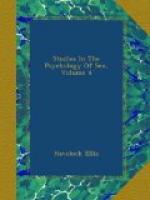It may be of interest to note, in this connection, that smell and taste hallucinations appear to be specially frequent in forms of religious insanity. Thus, Dr. Zurcher, in her inaugural dissertation on Joan of Arc (Jeanne d’Arc, Leipzig, 1895, p. 72), estimates that on the average in such insanity nearly 50 per cent, of the hallucinations affect smell and taste; she refers also to the olfactory hallucinations of great religious leaders, Francis of Assisi, Katherina Emmerich, Lazzaretti, and the Anabaptists.
It may well be, as Zwaardemaker has suggested in his Physiologie des Geruchs, that the nasal congestion at menstruation and similar phenomena are connected with that association of smell and sexuality which is observable throughout the whole animal world, and that the congestion brings about a temporary increase of olfactory sensitiveness during the stage of sexual excitation.[43] Careful investigation of olfactory acuteness would reveal the existence of such menstrual heightening of its acuity.
In a few exceptional, but still quite healthy people, smell would appear to possess an emotional predominance which it cannot be said to possess in the average person. These exceptional people are of what Binet in his study of sexual fetichism calls olfactive type; such persons form a group which, though of smaller size and less importance, is fairly comparable to the well-known groups of visual type, of auditory type, and of psychomotor type. Such people would be more attentive to odors, more moved by olfactory sympathies and antipathies, than are ordinary people. For these, it may well be, the supremacy accorded to olfactory influences in Jaeger’s Entdeckung der Seele, though extravagantly incorrect for ordinary persons, may appear quite reasonable.
It is certain also that a great many neurasthenic people, and particularly those who are sexually neurasthenic, are peculiarly susceptible to olfactory influences. A number of eminent poets and novelists—especially, it would appear, in France—seem to be in this case. Baudelaire, of all great poets, has most persistently and most elaborately emphasized the imaginative and emotional significance of odor; the Fleurs du Mal and many of the Petits Poemes en Prose are, from this point of view, of great interest. There can be no doubt that




